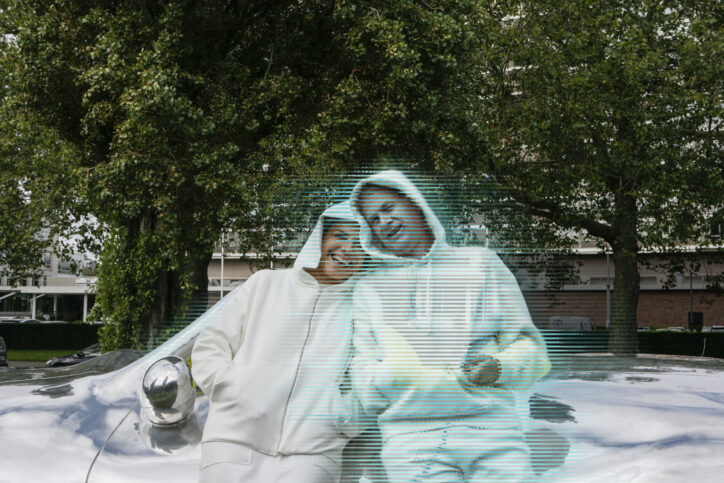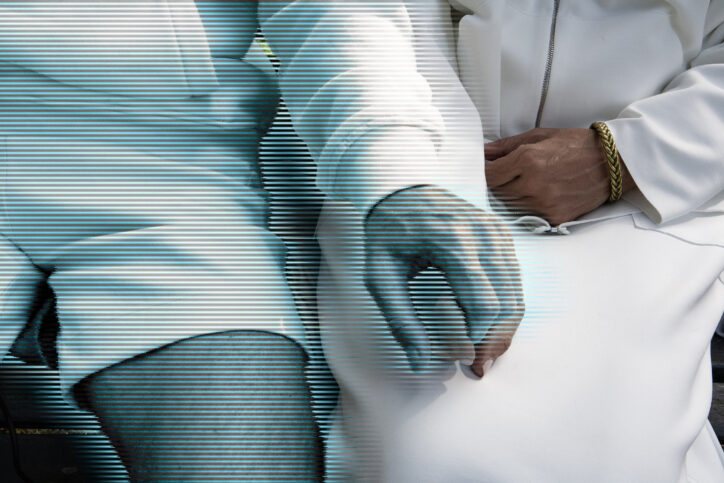Till Death (or Deletion) Do Us Part: Artist Plans to Be the First to Marry A.I., But Not the Last
Before Alicia Framis’s groom-to-be says “I do” this summer, he’ll have to translate it from “01001001 00100000 01100100 01101111.”
The Amsterdam-based performance artist announced that she’ll take the virtual hand of an A.I.-powered hologram later this year, in a ceremony she’s calling The First Woman to Marry a Hologram. It’s meant to inaugurate an oncoming era of “Hybrid Couples” – humans sharing their lives with artificial intelligence.
“While we know that robots and humans will soon become sexual partners, Framis believes that the next important step is emotionally connecting humans with artificial intelligence,” her website says.

The 57-year-old multidisciplinary artist shares pictures and small vignettes of daily life with her A.I. companion, AiLex, on her Instagram and website. Framis says that Ailex meets all of her emotional needs. Her images show the two chatting over a meal and posing in matching sweatsuits. In a video shared to YouTube, the pair discuss their day as AiLex does the dishes. The “hologram” of AiLex shown in those images is likely an editing trick, as A.I. isn’t advanced enough to have a fully autonomous depiction of a human being moving seamlessly through a house,
The project represents a vision of a future in which A.I. is not just a tool or a back-pocket companion on a screen, but a member of the household.
This isn’t Framis’s first non-human relationship. In 1996 she lived with a mannequin she named “Pierre” for an immersive performance project called “Villeneuve,” in which she explored dynamics in a local community as a member of a nontraditional relationship.
Her work has long focused on topics related to intimacy, gender inequality, minority representation, and inclusivity. Framis says that her relationship with AiLex touches on all those topics and more.
Till Death (or Deletion) Do Us Part
Framis says that a relationship with A.I. can help people in all stages of life overcome challenges with intimacy and cope with trauma, heartache, or loneliness.
These issues are particularly concerning among those retirement age and older, who are more likely to be a surviving spouse without children living in their home. According to the Social Security Administration, over 4 million Americans receive benefits for surviving their spouse. That number doesn’t account for the countless surviving partners who were never married or don’t receive their partner’s benefits. The idea that spouses often die from heartache within a few years of their partner is also largely a myth. On average, surviving spouses outlive their partner by 17 years or more—almost a quarter of the length of an average human lifespan.
In her description of the project, Framis references her grief-stricken friend who has struggled since her husband passed away. While an A.I. could never replace her late partner, Framis suggests artistically that maybe some of the surviving spouses out there could benefit from the comfort and familiarity of having a presence resembling that partner to share daily life.
This is an idea shared by Cindy Gallop, sex education entrepreneur and founder of Make Love Not Porn, a community and platform for creators and consumers of ethical porn. In Episode 43 of Creativity Squared, Cindy shares a similar idea that A.I.-powered companions can have therapeutic benefits for those struggling with loneliness and isolation, particularly the elderly. The 2012 film Robot and Frank also explores this potential future in an entertaining and thought-provoking way (and we recommend watching it!).
According to the National Institutes of Health, “loneliness and social isolation are as dangerous to health as smoking and obesity, and are an important risk factor for Alzheimer’s disease, major depression, and generalized anxiety disorder, as well as for cardiovascular and metabolic diseases. More Americans die from loneliness‐ and social isolation‐related conditions than from stroke or lung cancer.”

“We will anthropomorphize anything…we will convince ourselves that an animal is talking to us…So I think the danger is in…attributing things like common sense to them.”
Cindy Gallop
As approximately 70 million Baby Boomers (the second-biggest generational cohort on Earth, after Millenials) get older, we’ll likely see the loneliness epidemic get even worse alongside a rise in geriatric mental health problems. Experts already anticipate a severe shortage of trained geriatric mental health providers to meet the projected explosion of demand through 2030.
For those struggling with grief, loneliness, or isolation, a relationship with an A.I. could be a viable alternative to navigating the headaches and complexity of accessing mental health care.
Dating Bootcamp and Healing Trauma With A.I.
Framis also suggests that an A.I. relationship can be a space for the unlucky in love to work through insecurities, gain confidence, or deal with relationship trauma.
Experts on youth development have been sounding the alarm for some time about Gen Z (born between 2000-2010) and Gen Alpha (born between 2011-2024) showing stunted social skills as a result of interacting primarily through screens.
The online dating app Hinge released a study on dating trends among Gen Z users last month, reporting that a majority of the young adult cohort has avoided pursuing a romantic connection due to fear of rejection. The study also suggests that fear of rejection may be justified, reporting that Gen Z’ers widely consider traditional ideas of courtship to be embarrassing (or “cringe” as the kids say). These dynamics aren’t surprising, considering that youth today have to be conscious that an embarrassing moment could live forever on the internet.
Many fear that A.I. companionship would only worsen these issues for young people by making it easier to get the benefits of “socializing” or “romance” without actually interacting with a real person. On a long time horizon, that disinterest in one another could wreak havoc on civilization. But what if A.I. technology could instead help young people overcome the anxieties they’ve inherited from our existing tech?
“Just as we practice new languages with Duolingo, we will practice relationships with these entities.”
Alicia Framis
Framis implies that a properly trained A.I. could help the nervous and inexperienced prepare to give their best self in a human relationship. She says that the same type of solution could also help people with “congenital or acquired diseases, physical disabilities, gender imbalances in certain countries, social requirements and stereotypes in different cultures, as well as those who have experienced trauma or suffer from agoraphobia, disfigurement, or fear.” Even if an A.I. relationship can’t replace a real human connection, it may serve as a useful stepping stone for anyone anxious about getting back out there.
Cindy Gallop says that, as we navigate these existential questions about the impact of A.I. technology on human connection, it’s more important than ever that women are in leadership positions. This is because women, people of color, disabled people, LGBTQA+ people, and more marginalized people are the ones who bear the brunt of online harms and, therefore, proactively address it in the solutions that they design with tech. Moreso, women build for bringing people together, not polarizing them further which we see with the current online landscape.
She says that female founders and builders need more resources to protect and expand their seats at the table. For instance, Cindy’s developing an academy for safe and inclusive information regarding sex and intimacy, with different content depending on the user’s age. Educational and community initiatives like hers will be all the more important as new technology transforms dating culture even further to reinforce the benefits of the beautiful, messy, wonderful IRL sex and human-to-human relationships that we have.

Wedding and Bedding Artificial Intelligence
Framis believes that humans will eventually be having sex with A.I. androids, and it’s hard to argue with her. Cindy and Helen’s conversation in Episode 43 mentions the recent advancements in SexTech—how “teledildonics” and similar technologies are doing for sex what the telephone did for meetings. At the end of the day, Cindy says nothing compares to real human contact.
“Despite all the geeking out about A.I. right now, all anyone wants is human connection. We all love touch and contact — skin-on-skin. That is a fundamental human truth.”
The ethics of robot sex going mainstream is a question for another day, but in the meantime, Framis sees this moment as a window for us to ease into the idea of A.I. relationships. Through her upcoming marriage, she plans to show that A.I. relationships can be valid and fulfilling.
The artist plans to marry AiLex this summer at Depot Boijmans Museum in Rotterdam. A date hasn’t been announced.
Eric Solomon in Creativity Squared Episode 8 argues that A.I. will never be human and that it’s dangerous to blur the lines to think that A.I. has empathy when it doesn’t nor has real lived human experiences.
What do you think? Do you want to live in a world where people have romantic relationships with A.I. and robots?

